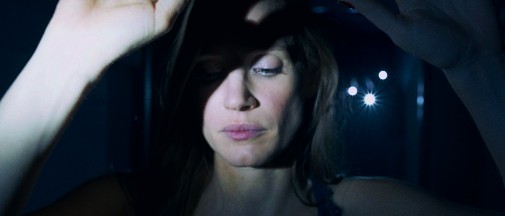
Nicole Kidman just won the Golden Globe for Best Actress in a Drama for her work in Aaron Sorkin's third feature as a director, Being the Ricardos. In truth, most of the writer turned writer/director's projects have garnered awards attention, so this win shouldn't be surprising. The first two movies he directed Trial of the Chicago 7 and Molly's Game earned Sorkin Oscar nominations for writing. His 2017 directorial debut, Molly's Game has another connection to the current awards season. Since Zero Dark Thirty earned her a Best Actress nod, Jessica Chastain has tried to return to the Academy's good graces but it hasn't yet happened. This year, The Eyes of Tammy Faye could end her Oscar dry spell.
As we wait for nomination morning, let's look back at Chastain's performance in Sorkin's gambling drama as the real-life character, Molly Bloom…

Jessica Chastain delivers Sorkin's typical rapid-fire dialogue like she was born speaking it, though the movie starts with narration rather than conversation. It's at the Olympic qualifiers in freestyle skiing when 20-year-old Molly Bloom suffers an accident that puts an end to her career in sports. Throughout the snowy prologue, the actress's face remains a mask of deep concentration on the crest of anger, while her voice rings in the soundtrack, an obstinate tirade that ends bluntly with "fuck you." It's one hell of an introduction, especially considering what's to follow. The next time we see the real-life athlete turned wanted criminal, she's being arrested by the FBI.
Agents invade her home at night, a flurry of confusion grounded by Chastain's even-footed reactions. Her projection of frustration almost obfuscates the glimmer of panic, a game of cross-wired emotion ruled by an ideal of outward strength. Such multifaceted registers became more evident, even humorous, as we see the beginning of Bloom's involvement in the high-stakes poker business. Seeing her maneuver, the indignities of working for a rude boss is rather exciting, for it allows Chastain to lace her inner fury with comedic beats. Moreover, it gives the camera a chance to observe Chastain's most remarkable quality in the role – an air of calculating intelligence.
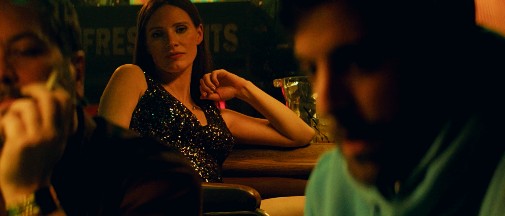
In the intercutting of timelines, the actress' work becomes an exercise in contrasts and continuations. That intelligence vibrating off the screen never changes, but levels of power, vulnerability, and assurance sure do. Watching young Bloom get her first millionaire tip from a Tobey Maguire-esque Michael Cera is to see a show of bemused glee, the blossoming of a mercenary's opportunistic hunger, drunk on the ambrosia of self-satisfaction. Cut to the more recent narrative thread, and she's no longer a woman seeing the way to power manifest in front of her. Instead, the actress must now play someone who's fallen from a high position. A figure used to authority must confront her present helplessness.

It's the difference between embodying a champion working towards victory and a champion dethroned after reaching the highest of highs. The gluttonous greed that radiates from Chastain in the flashbacks is an enticing sight, magnetic and entertaining. Her smiles are sharp, her gaze electrifying, posture a crescendo of confidence. However, there's more complexity at play in her scenes shared with Idris Elba as Bloom's attorney, Charlie Jaffey. Chastain shows the pains of being humble, the paroxysms of despair that happen beneath the stoic façade the Poker Princess presents to the world. It's not that Chastain makes bolder choices here, but that the script is more demanding, the characterization less obvious.
And yet, the most interesting beats of Chastain's work don't happen when facing off against Elba. Instead, those highlights are found in the perilous interactions when Molly Bloom has more at stake than just money or freedom. Chastain's at her best when playing a woman with her soul on the line. First up, there are the instances that find her growing attached to a player, be it her pity for Brian d'Arcy James' Bad Brad or the agony of witnessing Bill Camp's Harlan Eustice unravel at the poker table. Faced with her part in the man's destruction, Bloom realizes she shares guilt with the perfidious Player X before being destroyed by his wrath.

To interpret Bloom's loss of control over her life, business, and sense of responsibility, Chastain doesn't go down the route of tremulous demonstrativeness. Instead, she grows still, her neck tense and eyes laser-focused. Free-falling, the actress portrays downfall by foregrounding the herculean effort to hold it together. It's a clever paradox, painting a picture of the disordered inner life by underlining outward order with such vehemence that we can't help but wince at the gesture. In these states, we see Molly fall into temptation, choosing crime in a decision whose ardor Chastain showcases, almost as if the heroine knows she's just sealed her fate.
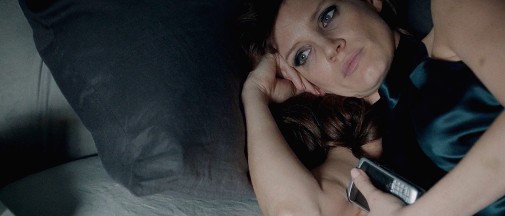
Falling deep into violent depression, addiction, Chastain's Molly Bloom grows detached, her comedic annoyance souring into a more unsettling sentiment. Attacked at home, prosecuted, and ready to plead guilty, to sell her integrity, she falls deeper into the abyss, pulling the film with her, down into the darkness. Such tenebrous passages crack open a gateway into catharsis, Sorkin-style. What I mean by that is "daddy issues," of course. While out and about in Central Park, working through her pent-up frustrations on the ice rink, Molly happens to find her father. At her lowest, the woman finally has a frank conversation with the patriarch whose prickliness, pressures, and disappointments have defined her life.
In some ways, they have fractured that life. The writing is clumsy but there's genuine emotion in there, somewhere. Maybe it's not truthful to a character study of the real Molly Bloom, but you can feel the lacerating quality of the confrontation it your bones. Deconstructing years of ossified contempt, Chastain gets to play against Sorkin's words for once in the movie, singing a song of their human impact rather than the showy cleverness of their construction, or their smarmy melodies. She unwinds a performance of few notes with expertise, allowing sharpness to crumble and her bark to smooth into plaintive wetness.
Maybe the best compliment one can give Jessica Chastain is that it's hard to imagine any other actress doing a better job with Sorkin's Molly Bloom. She's the best part of the movie, that's for sure.
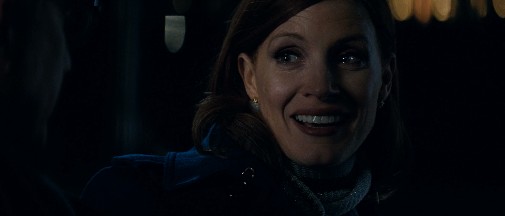
During the 2017/2018 awards season, Molly's Game's biggest successes came in the screenplay category. As for Jessica Chastain, she earned citations at the Critics Choice Awards, Golden Globes, and various regional critics associations. However, AMPAS chose five other performances to honor. They were Sally Hawkins in The Shape of Water, Frances McDormand in Three Billboards Outside Ebbing, Missouri, Margot Robbie in I, Tonya, Saoirse Ronan in Lady Bird, and Meryl Streep in The Post. McDormand won her second of third acting Oscars, while Chastain is still waiting for her third nomination.
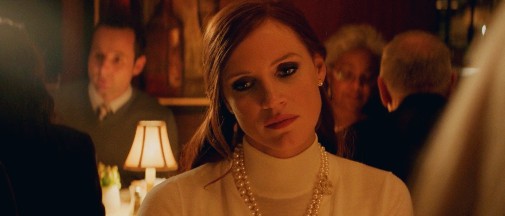
Molly's Game is available to rent online.